Psychological Contract Analysis: HRM, Recruitment, and Rewards
VerifiedAdded on 2022/09/16
|12
|3162
|42
Essay
AI Summary
This essay provides a thorough analysis of the psychological contract and its significance in Human Resource Management (HRM). It examines the role of the psychological contract as a measure influencing workplace behavior and explores its implications in terms of recruitment and reward strategies. The essay further investigates the influence of these strategies in strengthening the psychological contract within organizations, specifically focusing on the Australian Defence Force. The discussion covers the mutual expectations between employees and employers, the impact of contract violations, and the outcomes of fulfillment. It also analyzes integrated recruitment strategies, talent management, and the importance of employee rewards, considering both monetary and non-monetary factors. The essay highlights the relationship between psychological contracts, employee satisfaction, and turnover intentions, while also considering the impact of external factors and organizational strategies in managing these contracts effectively, particularly in the context of the Australian Defence Force's unique environment and goals.
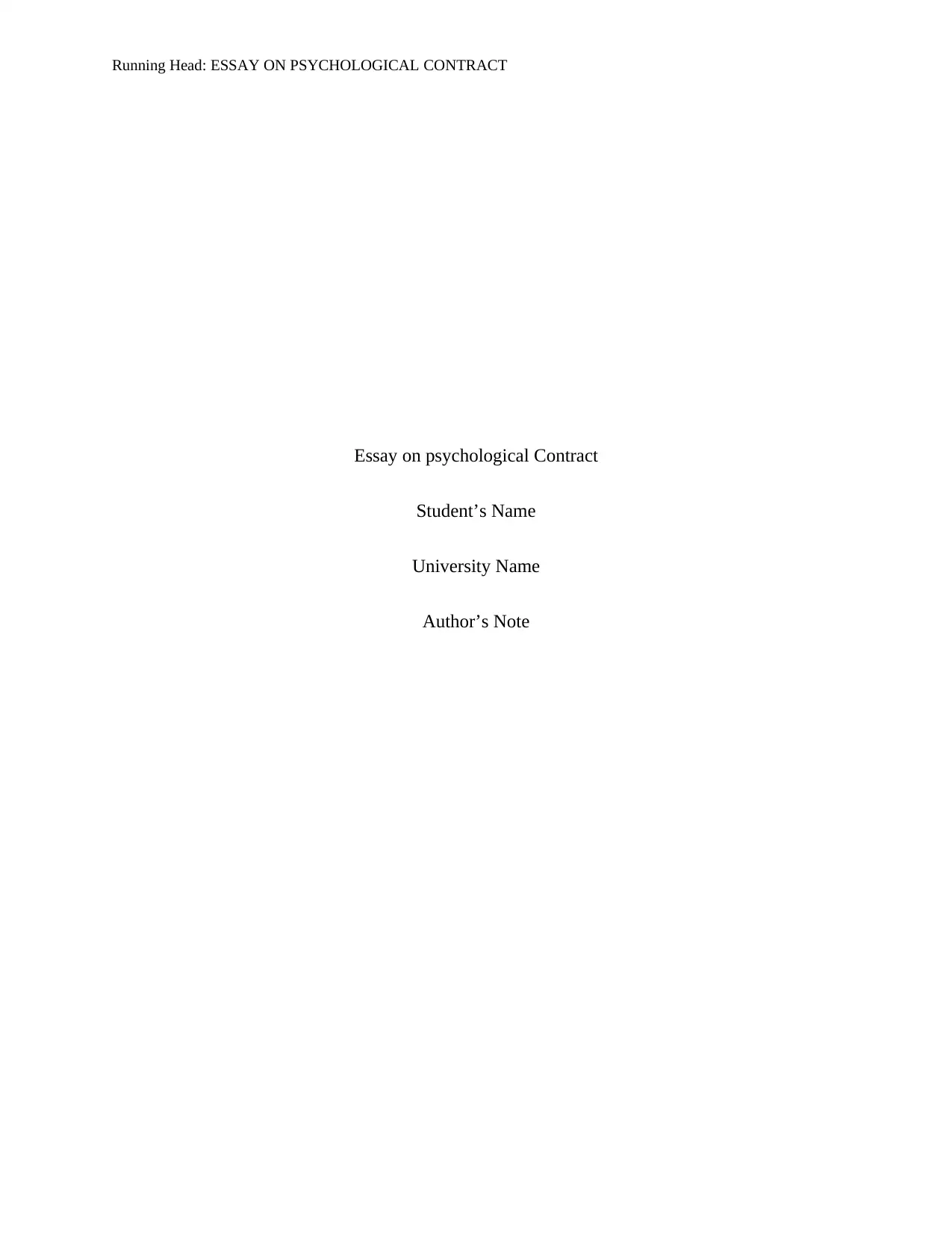
Running Head: ESSAY ON PSYCHOLOGICAL CONTRACT
Essay on psychological Contract
Student’s Name
University Name
Author’s Note
Essay on psychological Contract
Student’s Name
University Name
Author’s Note
Paraphrase This Document
Need a fresh take? Get an instant paraphrase of this document with our AI Paraphraser
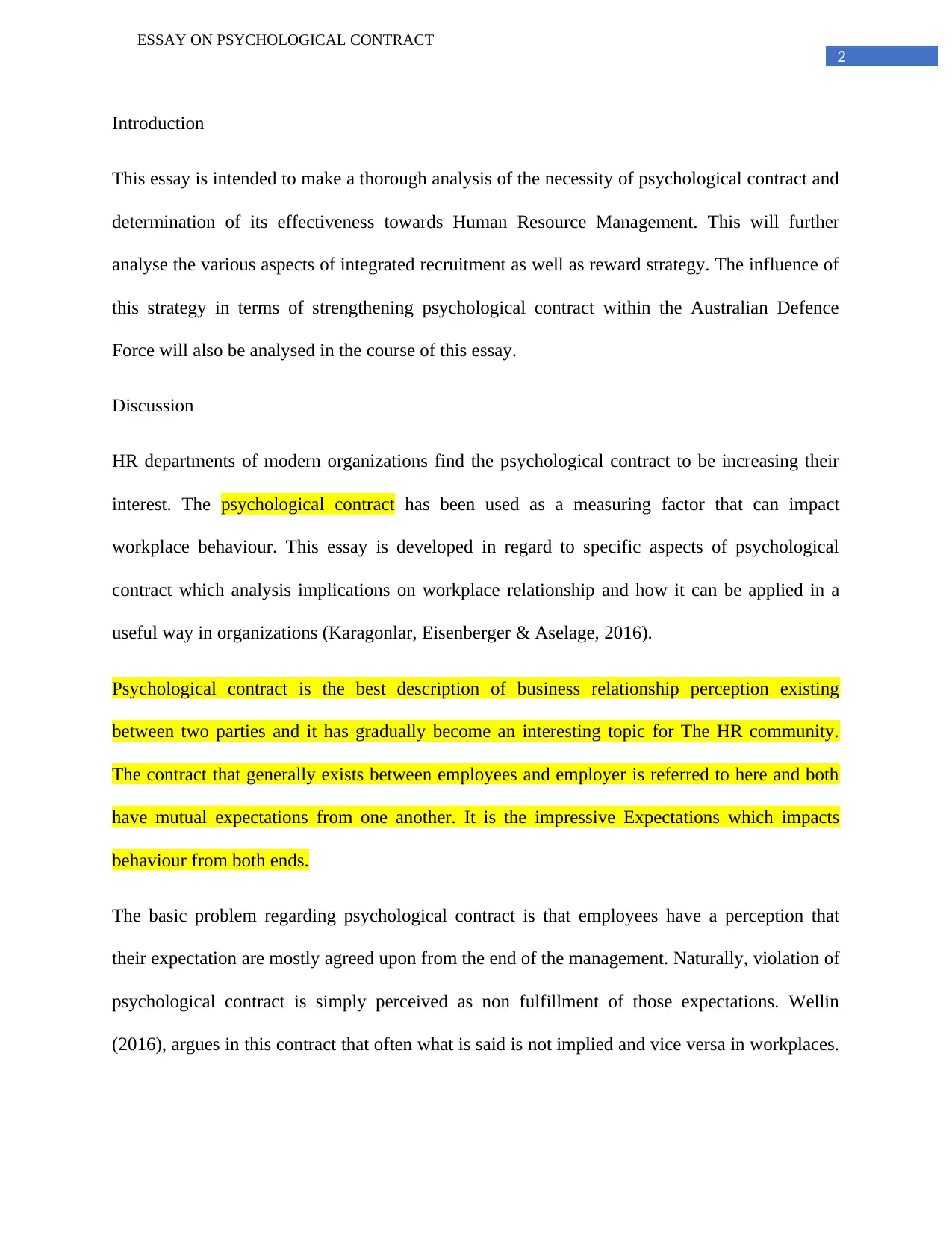
2
ESSAY ON PSYCHOLOGICAL CONTRACT
Introduction
This essay is intended to make a thorough analysis of the necessity of psychological contract and
determination of its effectiveness towards Human Resource Management. This will further
analyse the various aspects of integrated recruitment as well as reward strategy. The influence of
this strategy in terms of strengthening psychological contract within the Australian Defence
Force will also be analysed in the course of this essay.
Discussion
HR departments of modern organizations find the psychological contract to be increasing their
interest. The psychological contract has been used as a measuring factor that can impact
workplace behaviour. This essay is developed in regard to specific aspects of psychological
contract which analysis implications on workplace relationship and how it can be applied in a
useful way in organizations (Karagonlar, Eisenberger & Aselage, 2016).
Psychological contract is the best description of business relationship perception existing
between two parties and it has gradually become an interesting topic for The HR community.
The contract that generally exists between employees and employer is referred to here and both
have mutual expectations from one another. It is the impressive Expectations which impacts
behaviour from both ends.
The basic problem regarding psychological contract is that employees have a perception that
their expectation are mostly agreed upon from the end of the management. Naturally, violation of
psychological contract is simply perceived as non fulfillment of those expectations. Wellin
(2016), argues in this contract that often what is said is not implied and vice versa in workplaces.
ESSAY ON PSYCHOLOGICAL CONTRACT
Introduction
This essay is intended to make a thorough analysis of the necessity of psychological contract and
determination of its effectiveness towards Human Resource Management. This will further
analyse the various aspects of integrated recruitment as well as reward strategy. The influence of
this strategy in terms of strengthening psychological contract within the Australian Defence
Force will also be analysed in the course of this essay.
Discussion
HR departments of modern organizations find the psychological contract to be increasing their
interest. The psychological contract has been used as a measuring factor that can impact
workplace behaviour. This essay is developed in regard to specific aspects of psychological
contract which analysis implications on workplace relationship and how it can be applied in a
useful way in organizations (Karagonlar, Eisenberger & Aselage, 2016).
Psychological contract is the best description of business relationship perception existing
between two parties and it has gradually become an interesting topic for The HR community.
The contract that generally exists between employees and employer is referred to here and both
have mutual expectations from one another. It is the impressive Expectations which impacts
behaviour from both ends.
The basic problem regarding psychological contract is that employees have a perception that
their expectation are mostly agreed upon from the end of the management. Naturally, violation of
psychological contract is simply perceived as non fulfillment of those expectations. Wellin
(2016), argues in this contract that often what is said is not implied and vice versa in workplaces.
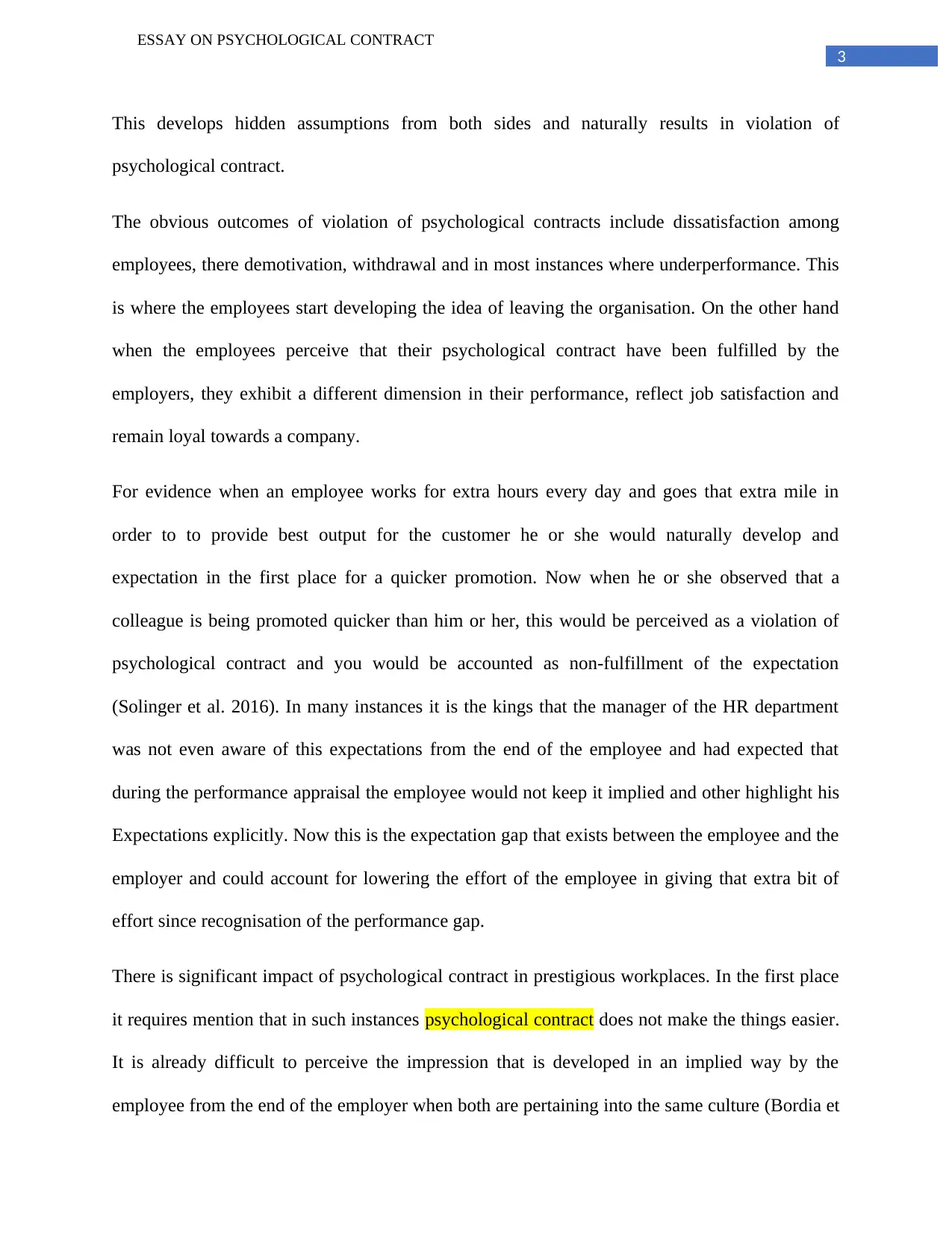
3
ESSAY ON PSYCHOLOGICAL CONTRACT
This develops hidden assumptions from both sides and naturally results in violation of
psychological contract.
The obvious outcomes of violation of psychological contracts include dissatisfaction among
employees, there demotivation, withdrawal and in most instances where underperformance. This
is where the employees start developing the idea of leaving the organisation. On the other hand
when the employees perceive that their psychological contract have been fulfilled by the
employers, they exhibit a different dimension in their performance, reflect job satisfaction and
remain loyal towards a company.
For evidence when an employee works for extra hours every day and goes that extra mile in
order to to provide best output for the customer he or she would naturally develop and
expectation in the first place for a quicker promotion. Now when he or she observed that a
colleague is being promoted quicker than him or her, this would be perceived as a violation of
psychological contract and you would be accounted as non-fulfillment of the expectation
(Solinger et al. 2016). In many instances it is the kings that the manager of the HR department
was not even aware of this expectations from the end of the employee and had expected that
during the performance appraisal the employee would not keep it implied and other highlight his
Expectations explicitly. Now this is the expectation gap that exists between the employee and the
employer and could account for lowering the effort of the employee in giving that extra bit of
effort since recognisation of the performance gap.
There is significant impact of psychological contract in prestigious workplaces. In the first place
it requires mention that in such instances psychological contract does not make the things easier.
It is already difficult to perceive the impression that is developed in an implied way by the
employee from the end of the employer when both are pertaining into the same culture (Bordia et
ESSAY ON PSYCHOLOGICAL CONTRACT
This develops hidden assumptions from both sides and naturally results in violation of
psychological contract.
The obvious outcomes of violation of psychological contracts include dissatisfaction among
employees, there demotivation, withdrawal and in most instances where underperformance. This
is where the employees start developing the idea of leaving the organisation. On the other hand
when the employees perceive that their psychological contract have been fulfilled by the
employers, they exhibit a different dimension in their performance, reflect job satisfaction and
remain loyal towards a company.
For evidence when an employee works for extra hours every day and goes that extra mile in
order to to provide best output for the customer he or she would naturally develop and
expectation in the first place for a quicker promotion. Now when he or she observed that a
colleague is being promoted quicker than him or her, this would be perceived as a violation of
psychological contract and you would be accounted as non-fulfillment of the expectation
(Solinger et al. 2016). In many instances it is the kings that the manager of the HR department
was not even aware of this expectations from the end of the employee and had expected that
during the performance appraisal the employee would not keep it implied and other highlight his
Expectations explicitly. Now this is the expectation gap that exists between the employee and the
employer and could account for lowering the effort of the employee in giving that extra bit of
effort since recognisation of the performance gap.
There is significant impact of psychological contract in prestigious workplaces. In the first place
it requires mention that in such instances psychological contract does not make the things easier.
It is already difficult to perceive the impression that is developed in an implied way by the
employee from the end of the employer when both are pertaining into the same culture (Bordia et
⊘ This is a preview!⊘
Do you want full access?
Subscribe today to unlock all pages.

Trusted by 1+ million students worldwide
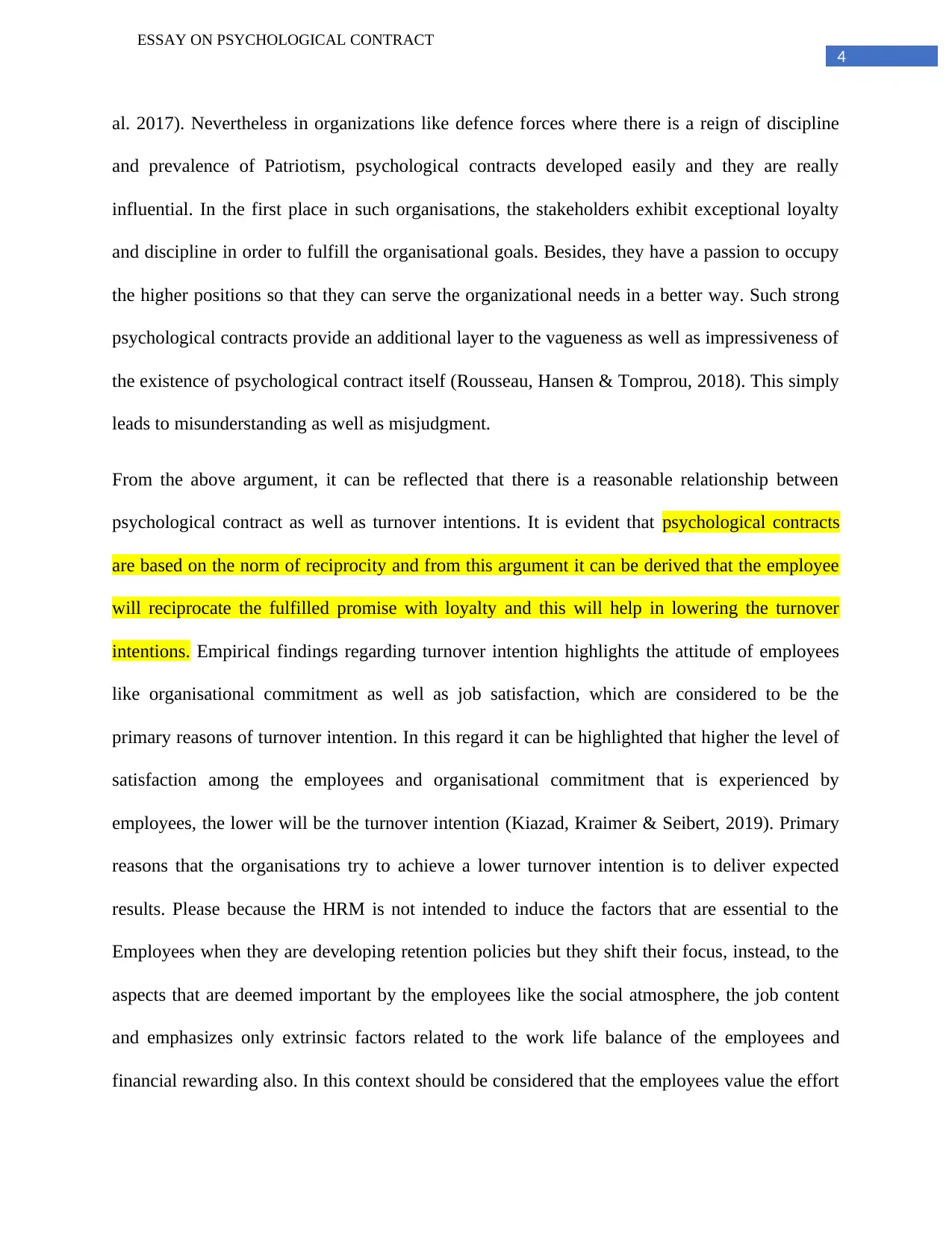
4
ESSAY ON PSYCHOLOGICAL CONTRACT
al. 2017). Nevertheless in organizations like defence forces where there is a reign of discipline
and prevalence of Patriotism, psychological contracts developed easily and they are really
influential. In the first place in such organisations, the stakeholders exhibit exceptional loyalty
and discipline in order to fulfill the organisational goals. Besides, they have a passion to occupy
the higher positions so that they can serve the organizational needs in a better way. Such strong
psychological contracts provide an additional layer to the vagueness as well as impressiveness of
the existence of psychological contract itself (Rousseau, Hansen & Tomprou, 2018). This simply
leads to misunderstanding as well as misjudgment.
From the above argument, it can be reflected that there is a reasonable relationship between
psychological contract as well as turnover intentions. It is evident that psychological contracts
are based on the norm of reciprocity and from this argument it can be derived that the employee
will reciprocate the fulfilled promise with loyalty and this will help in lowering the turnover
intentions. Empirical findings regarding turnover intention highlights the attitude of employees
like organisational commitment as well as job satisfaction, which are considered to be the
primary reasons of turnover intention. In this regard it can be highlighted that higher the level of
satisfaction among the employees and organisational commitment that is experienced by
employees, the lower will be the turnover intention (Kiazad, Kraimer & Seibert, 2019). Primary
reasons that the organisations try to achieve a lower turnover intention is to deliver expected
results. Please because the HRM is not intended to induce the factors that are essential to the
Employees when they are developing retention policies but they shift their focus, instead, to the
aspects that are deemed important by the employees like the social atmosphere, the job content
and emphasizes only extrinsic factors related to the work life balance of the employees and
financial rewarding also. In this context should be considered that the employees value the effort
ESSAY ON PSYCHOLOGICAL CONTRACT
al. 2017). Nevertheless in organizations like defence forces where there is a reign of discipline
and prevalence of Patriotism, psychological contracts developed easily and they are really
influential. In the first place in such organisations, the stakeholders exhibit exceptional loyalty
and discipline in order to fulfill the organisational goals. Besides, they have a passion to occupy
the higher positions so that they can serve the organizational needs in a better way. Such strong
psychological contracts provide an additional layer to the vagueness as well as impressiveness of
the existence of psychological contract itself (Rousseau, Hansen & Tomprou, 2018). This simply
leads to misunderstanding as well as misjudgment.
From the above argument, it can be reflected that there is a reasonable relationship between
psychological contract as well as turnover intentions. It is evident that psychological contracts
are based on the norm of reciprocity and from this argument it can be derived that the employee
will reciprocate the fulfilled promise with loyalty and this will help in lowering the turnover
intentions. Empirical findings regarding turnover intention highlights the attitude of employees
like organisational commitment as well as job satisfaction, which are considered to be the
primary reasons of turnover intention. In this regard it can be highlighted that higher the level of
satisfaction among the employees and organisational commitment that is experienced by
employees, the lower will be the turnover intention (Kiazad, Kraimer & Seibert, 2019). Primary
reasons that the organisations try to achieve a lower turnover intention is to deliver expected
results. Please because the HRM is not intended to induce the factors that are essential to the
Employees when they are developing retention policies but they shift their focus, instead, to the
aspects that are deemed important by the employees like the social atmosphere, the job content
and emphasizes only extrinsic factors related to the work life balance of the employees and
financial rewarding also. In this context should be considered that the employees value the effort
Paraphrase This Document
Need a fresh take? Get an instant paraphrase of this document with our AI Paraphraser
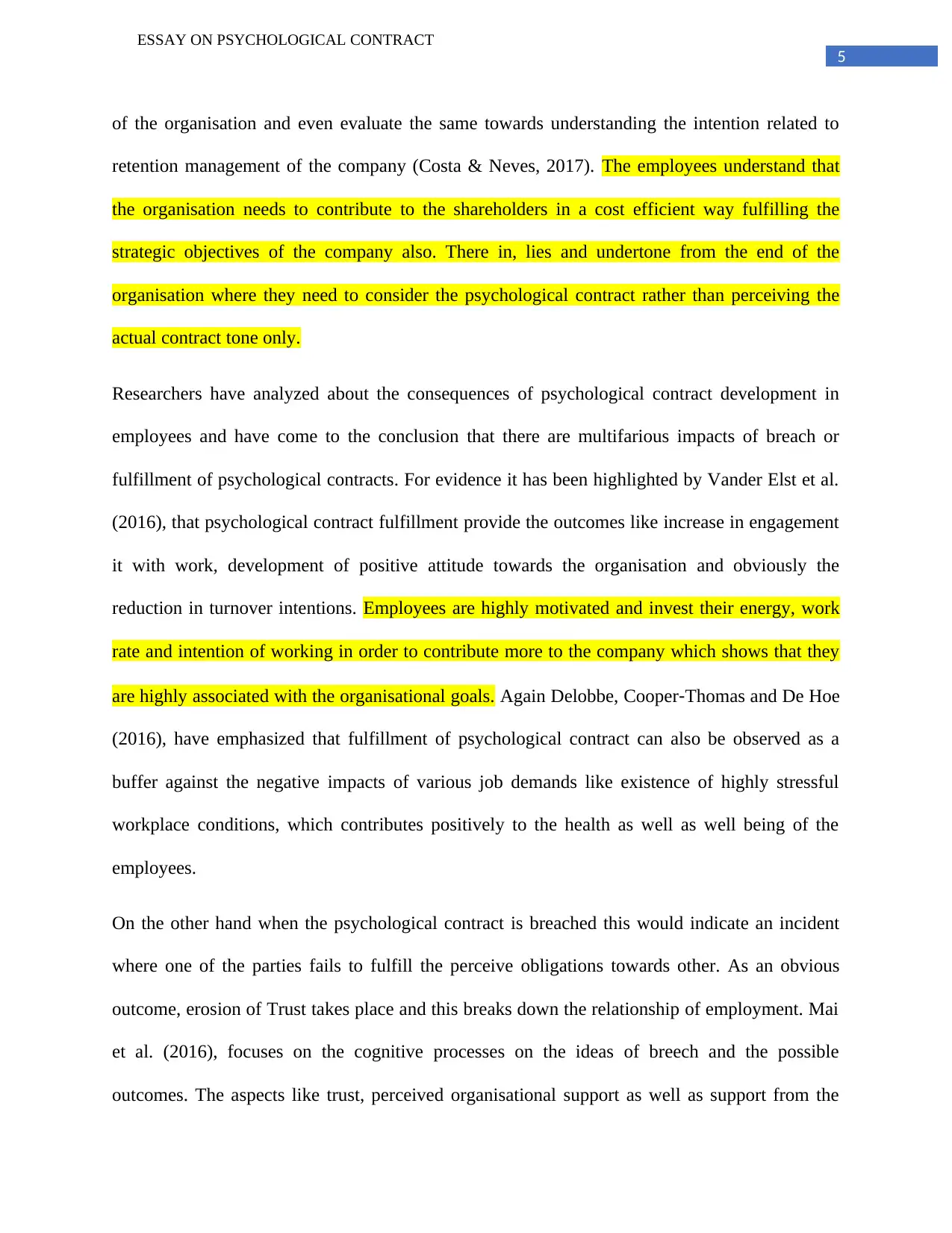
5
ESSAY ON PSYCHOLOGICAL CONTRACT
of the organisation and even evaluate the same towards understanding the intention related to
retention management of the company (Costa & Neves, 2017). The employees understand that
the organisation needs to contribute to the shareholders in a cost efficient way fulfilling the
strategic objectives of the company also. There in, lies and undertone from the end of the
organisation where they need to consider the psychological contract rather than perceiving the
actual contract tone only.
Researchers have analyzed about the consequences of psychological contract development in
employees and have come to the conclusion that there are multifarious impacts of breach or
fulfillment of psychological contracts. For evidence it has been highlighted by Vander Elst et al.
(2016), that psychological contract fulfillment provide the outcomes like increase in engagement
it with work, development of positive attitude towards the organisation and obviously the
reduction in turnover intentions. Employees are highly motivated and invest their energy, work
rate and intention of working in order to contribute more to the company which shows that they
are highly associated with the organisational goals. Again Delobbe, Cooper‐Thomas and De Hoe
(2016), have emphasized that fulfillment of psychological contract can also be observed as a
buffer against the negative impacts of various job demands like existence of highly stressful
workplace conditions, which contributes positively to the health as well as well being of the
employees.
On the other hand when the psychological contract is breached this would indicate an incident
where one of the parties fails to fulfill the perceive obligations towards other. As an obvious
outcome, erosion of Trust takes place and this breaks down the relationship of employment. Mai
et al. (2016), focuses on the cognitive processes on the ideas of breech and the possible
outcomes. The aspects like trust, perceived organisational support as well as support from the
ESSAY ON PSYCHOLOGICAL CONTRACT
of the organisation and even evaluate the same towards understanding the intention related to
retention management of the company (Costa & Neves, 2017). The employees understand that
the organisation needs to contribute to the shareholders in a cost efficient way fulfilling the
strategic objectives of the company also. There in, lies and undertone from the end of the
organisation where they need to consider the psychological contract rather than perceiving the
actual contract tone only.
Researchers have analyzed about the consequences of psychological contract development in
employees and have come to the conclusion that there are multifarious impacts of breach or
fulfillment of psychological contracts. For evidence it has been highlighted by Vander Elst et al.
(2016), that psychological contract fulfillment provide the outcomes like increase in engagement
it with work, development of positive attitude towards the organisation and obviously the
reduction in turnover intentions. Employees are highly motivated and invest their energy, work
rate and intention of working in order to contribute more to the company which shows that they
are highly associated with the organisational goals. Again Delobbe, Cooper‐Thomas and De Hoe
(2016), have emphasized that fulfillment of psychological contract can also be observed as a
buffer against the negative impacts of various job demands like existence of highly stressful
workplace conditions, which contributes positively to the health as well as well being of the
employees.
On the other hand when the psychological contract is breached this would indicate an incident
where one of the parties fails to fulfill the perceive obligations towards other. As an obvious
outcome, erosion of Trust takes place and this breaks down the relationship of employment. Mai
et al. (2016), focuses on the cognitive processes on the ideas of breech and the possible
outcomes. The aspects like trust, perceived organisational support as well as support from the
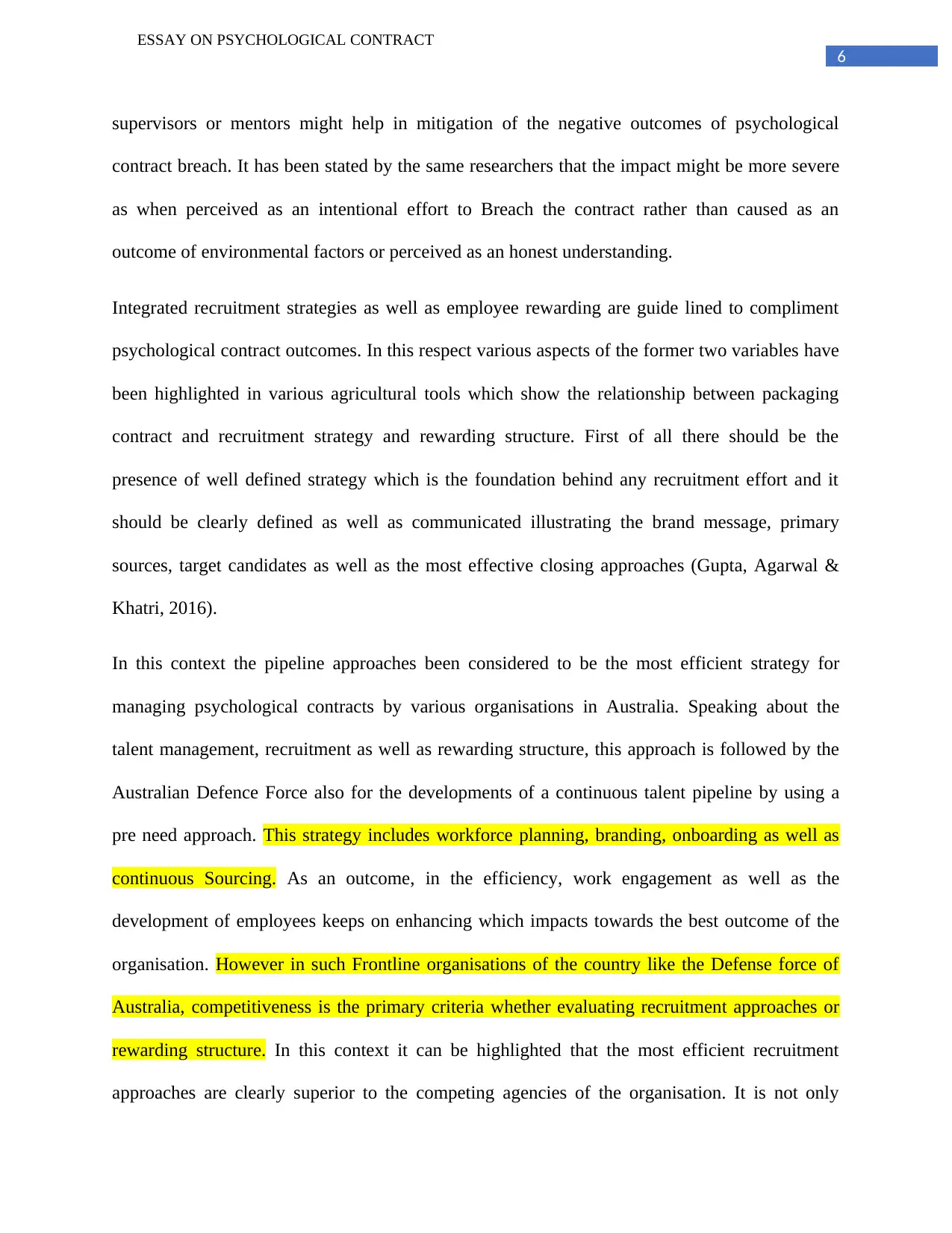
6
ESSAY ON PSYCHOLOGICAL CONTRACT
supervisors or mentors might help in mitigation of the negative outcomes of psychological
contract breach. It has been stated by the same researchers that the impact might be more severe
as when perceived as an intentional effort to Breach the contract rather than caused as an
outcome of environmental factors or perceived as an honest understanding.
Integrated recruitment strategies as well as employee rewarding are guide lined to compliment
psychological contract outcomes. In this respect various aspects of the former two variables have
been highlighted in various agricultural tools which show the relationship between packaging
contract and recruitment strategy and rewarding structure. First of all there should be the
presence of well defined strategy which is the foundation behind any recruitment effort and it
should be clearly defined as well as communicated illustrating the brand message, primary
sources, target candidates as well as the most effective closing approaches (Gupta, Agarwal &
Khatri, 2016).
In this context the pipeline approaches been considered to be the most efficient strategy for
managing psychological contracts by various organisations in Australia. Speaking about the
talent management, recruitment as well as rewarding structure, this approach is followed by the
Australian Defence Force also for the developments of a continuous talent pipeline by using a
pre need approach. This strategy includes workforce planning, branding, onboarding as well as
continuous Sourcing. As an outcome, in the efficiency, work engagement as well as the
development of employees keeps on enhancing which impacts towards the best outcome of the
organisation. However in such Frontline organisations of the country like the Defense force of
Australia, competitiveness is the primary criteria whether evaluating recruitment approaches or
rewarding structure. In this context it can be highlighted that the most efficient recruitment
approaches are clearly superior to the competing agencies of the organisation. It is not only
ESSAY ON PSYCHOLOGICAL CONTRACT
supervisors or mentors might help in mitigation of the negative outcomes of psychological
contract breach. It has been stated by the same researchers that the impact might be more severe
as when perceived as an intentional effort to Breach the contract rather than caused as an
outcome of environmental factors or perceived as an honest understanding.
Integrated recruitment strategies as well as employee rewarding are guide lined to compliment
psychological contract outcomes. In this respect various aspects of the former two variables have
been highlighted in various agricultural tools which show the relationship between packaging
contract and recruitment strategy and rewarding structure. First of all there should be the
presence of well defined strategy which is the foundation behind any recruitment effort and it
should be clearly defined as well as communicated illustrating the brand message, primary
sources, target candidates as well as the most effective closing approaches (Gupta, Agarwal &
Khatri, 2016).
In this context the pipeline approaches been considered to be the most efficient strategy for
managing psychological contracts by various organisations in Australia. Speaking about the
talent management, recruitment as well as rewarding structure, this approach is followed by the
Australian Defence Force also for the developments of a continuous talent pipeline by using a
pre need approach. This strategy includes workforce planning, branding, onboarding as well as
continuous Sourcing. As an outcome, in the efficiency, work engagement as well as the
development of employees keeps on enhancing which impacts towards the best outcome of the
organisation. However in such Frontline organisations of the country like the Defense force of
Australia, competitiveness is the primary criteria whether evaluating recruitment approaches or
rewarding structure. In this context it can be highlighted that the most efficient recruitment
approaches are clearly superior to the competing agencies of the organisation. It is not only
⊘ This is a preview!⊘
Do you want full access?
Subscribe today to unlock all pages.

Trusted by 1+ million students worldwide
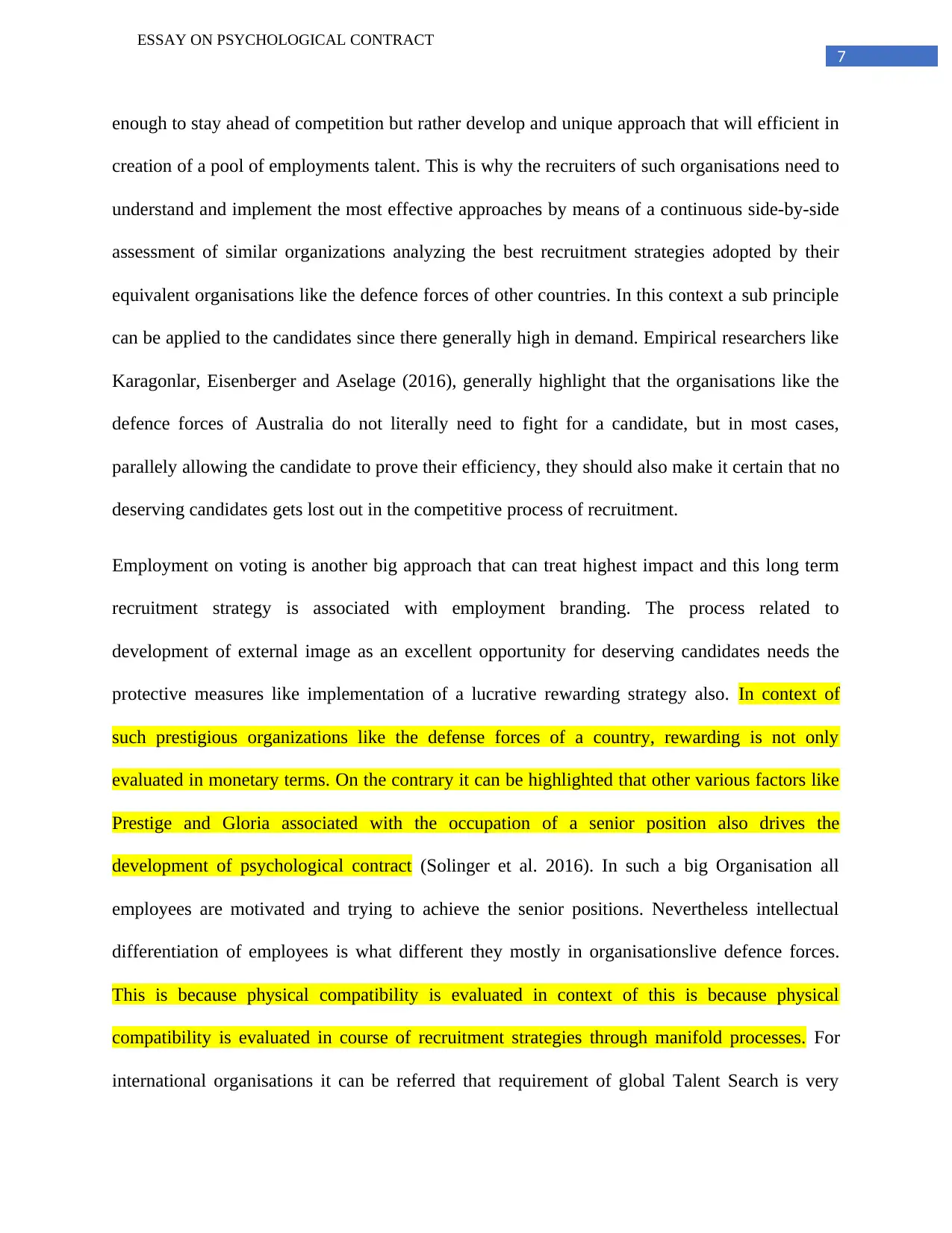
7
ESSAY ON PSYCHOLOGICAL CONTRACT
enough to stay ahead of competition but rather develop and unique approach that will efficient in
creation of a pool of employments talent. This is why the recruiters of such organisations need to
understand and implement the most effective approaches by means of a continuous side-by-side
assessment of similar organizations analyzing the best recruitment strategies adopted by their
equivalent organisations like the defence forces of other countries. In this context a sub principle
can be applied to the candidates since there generally high in demand. Empirical researchers like
Karagonlar, Eisenberger and Aselage (2016), generally highlight that the organisations like the
defence forces of Australia do not literally need to fight for a candidate, but in most cases,
parallely allowing the candidate to prove their efficiency, they should also make it certain that no
deserving candidates gets lost out in the competitive process of recruitment.
Employment on voting is another big approach that can treat highest impact and this long term
recruitment strategy is associated with employment branding. The process related to
development of external image as an excellent opportunity for deserving candidates needs the
protective measures like implementation of a lucrative rewarding strategy also. In context of
such prestigious organizations like the defense forces of a country, rewarding is not only
evaluated in monetary terms. On the contrary it can be highlighted that other various factors like
Prestige and Gloria associated with the occupation of a senior position also drives the
development of psychological contract (Solinger et al. 2016). In such a big Organisation all
employees are motivated and trying to achieve the senior positions. Nevertheless intellectual
differentiation of employees is what different they mostly in organisationslive defence forces.
This is because physical compatibility is evaluated in context of this is because physical
compatibility is evaluated in course of recruitment strategies through manifold processes. For
international organisations it can be referred that requirement of global Talent Search is very
ESSAY ON PSYCHOLOGICAL CONTRACT
enough to stay ahead of competition but rather develop and unique approach that will efficient in
creation of a pool of employments talent. This is why the recruiters of such organisations need to
understand and implement the most effective approaches by means of a continuous side-by-side
assessment of similar organizations analyzing the best recruitment strategies adopted by their
equivalent organisations like the defence forces of other countries. In this context a sub principle
can be applied to the candidates since there generally high in demand. Empirical researchers like
Karagonlar, Eisenberger and Aselage (2016), generally highlight that the organisations like the
defence forces of Australia do not literally need to fight for a candidate, but in most cases,
parallely allowing the candidate to prove their efficiency, they should also make it certain that no
deserving candidates gets lost out in the competitive process of recruitment.
Employment on voting is another big approach that can treat highest impact and this long term
recruitment strategy is associated with employment branding. The process related to
development of external image as an excellent opportunity for deserving candidates needs the
protective measures like implementation of a lucrative rewarding strategy also. In context of
such prestigious organizations like the defense forces of a country, rewarding is not only
evaluated in monetary terms. On the contrary it can be highlighted that other various factors like
Prestige and Gloria associated with the occupation of a senior position also drives the
development of psychological contract (Solinger et al. 2016). In such a big Organisation all
employees are motivated and trying to achieve the senior positions. Nevertheless intellectual
differentiation of employees is what different they mostly in organisationslive defence forces.
This is because physical compatibility is evaluated in context of this is because physical
compatibility is evaluated in course of recruitment strategies through manifold processes. For
international organisations it can be referred that requirement of global Talent Search is very
Paraphrase This Document
Need a fresh take? Get an instant paraphrase of this document with our AI Paraphraser
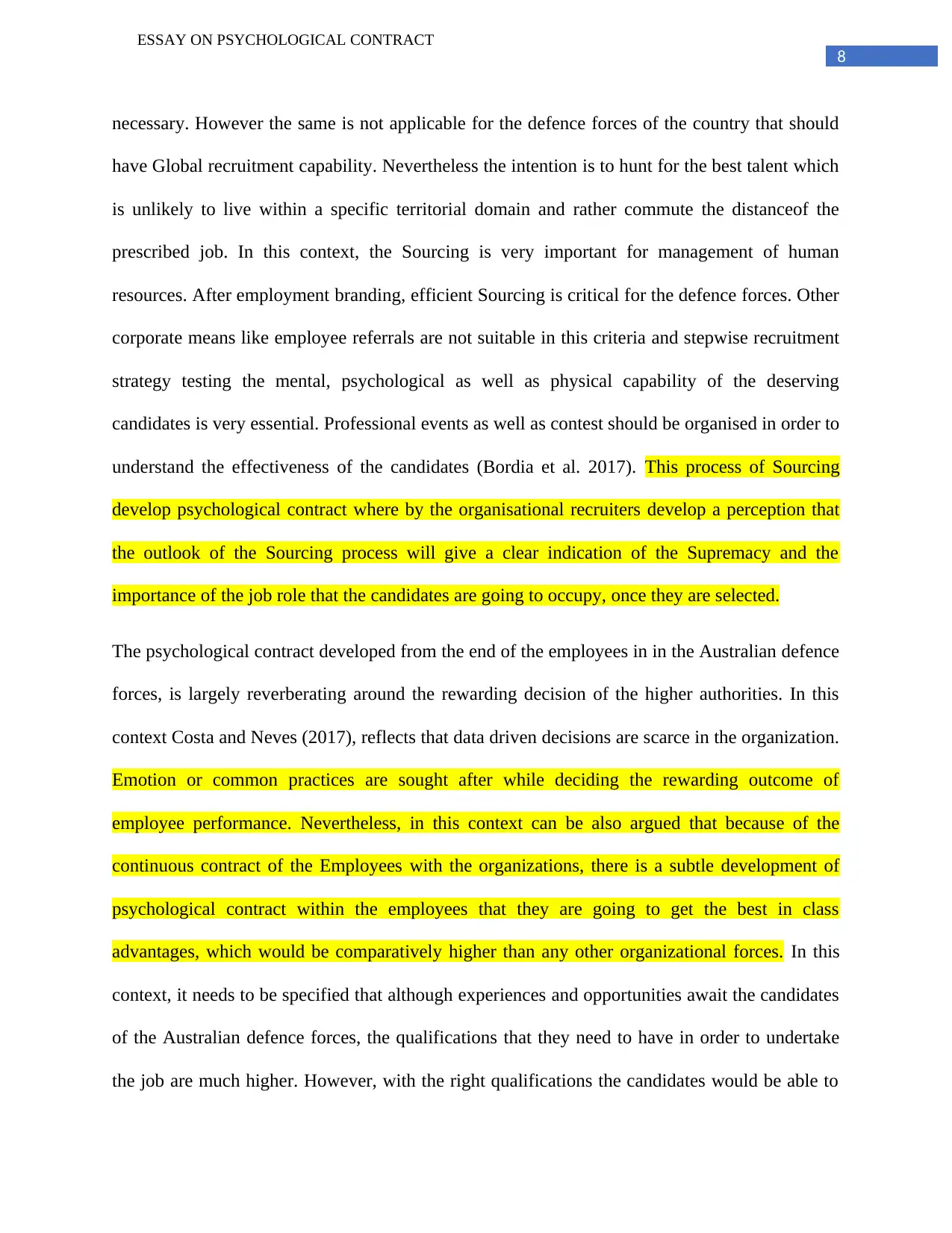
8
ESSAY ON PSYCHOLOGICAL CONTRACT
necessary. However the same is not applicable for the defence forces of the country that should
have Global recruitment capability. Nevertheless the intention is to hunt for the best talent which
is unlikely to live within a specific territorial domain and rather commute the distanceof the
prescribed job. In this context, the Sourcing is very important for management of human
resources. After employment branding, efficient Sourcing is critical for the defence forces. Other
corporate means like employee referrals are not suitable in this criteria and stepwise recruitment
strategy testing the mental, psychological as well as physical capability of the deserving
candidates is very essential. Professional events as well as contest should be organised in order to
understand the effectiveness of the candidates (Bordia et al. 2017). This process of Sourcing
develop psychological contract where by the organisational recruiters develop a perception that
the outlook of the Sourcing process will give a clear indication of the Supremacy and the
importance of the job role that the candidates are going to occupy, once they are selected.
The psychological contract developed from the end of the employees in in the Australian defence
forces, is largely reverberating around the rewarding decision of the higher authorities. In this
context Costa and Neves (2017), reflects that data driven decisions are scarce in the organization.
Emotion or common practices are sought after while deciding the rewarding outcome of
employee performance. Nevertheless, in this context can be also argued that because of the
continuous contract of the Employees with the organizations, there is a subtle development of
psychological contract within the employees that they are going to get the best in class
advantages, which would be comparatively higher than any other organizational forces. In this
context, it needs to be specified that although experiences and opportunities await the candidates
of the Australian defence forces, the qualifications that they need to have in order to undertake
the job are much higher. However, with the right qualifications the candidates would be able to
ESSAY ON PSYCHOLOGICAL CONTRACT
necessary. However the same is not applicable for the defence forces of the country that should
have Global recruitment capability. Nevertheless the intention is to hunt for the best talent which
is unlikely to live within a specific territorial domain and rather commute the distanceof the
prescribed job. In this context, the Sourcing is very important for management of human
resources. After employment branding, efficient Sourcing is critical for the defence forces. Other
corporate means like employee referrals are not suitable in this criteria and stepwise recruitment
strategy testing the mental, psychological as well as physical capability of the deserving
candidates is very essential. Professional events as well as contest should be organised in order to
understand the effectiveness of the candidates (Bordia et al. 2017). This process of Sourcing
develop psychological contract where by the organisational recruiters develop a perception that
the outlook of the Sourcing process will give a clear indication of the Supremacy and the
importance of the job role that the candidates are going to occupy, once they are selected.
The psychological contract developed from the end of the employees in in the Australian defence
forces, is largely reverberating around the rewarding decision of the higher authorities. In this
context Costa and Neves (2017), reflects that data driven decisions are scarce in the organization.
Emotion or common practices are sought after while deciding the rewarding outcome of
employee performance. Nevertheless, in this context can be also argued that because of the
continuous contract of the Employees with the organizations, there is a subtle development of
psychological contract within the employees that they are going to get the best in class
advantages, which would be comparatively higher than any other organizational forces. In this
context, it needs to be specified that although experiences and opportunities await the candidates
of the Australian defence forces, the qualifications that they need to have in order to undertake
the job are much higher. However, with the right qualifications the candidates would be able to
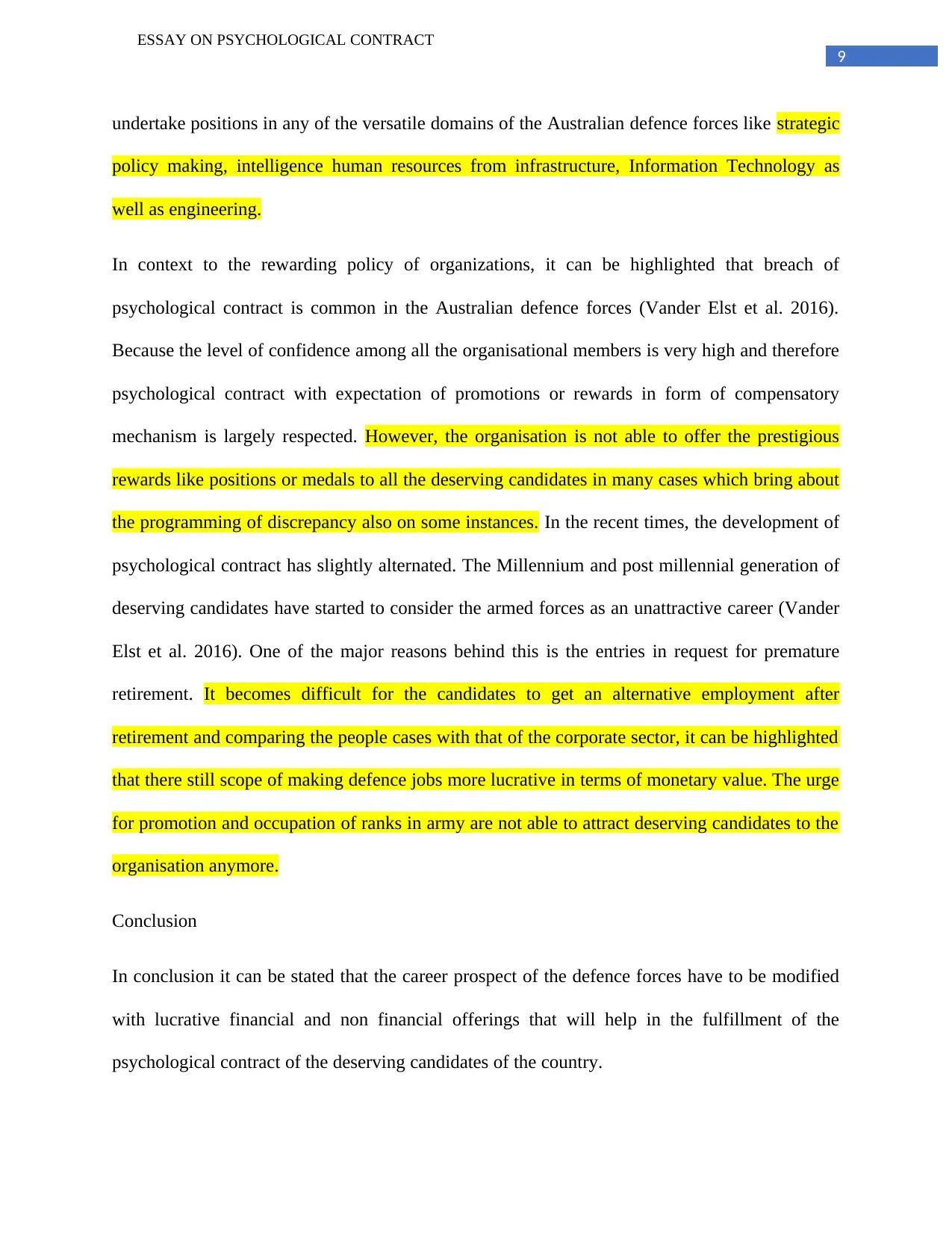
9
ESSAY ON PSYCHOLOGICAL CONTRACT
undertake positions in any of the versatile domains of the Australian defence forces like strategic
policy making, intelligence human resources from infrastructure, Information Technology as
well as engineering.
In context to the rewarding policy of organizations, it can be highlighted that breach of
psychological contract is common in the Australian defence forces (Vander Elst et al. 2016).
Because the level of confidence among all the organisational members is very high and therefore
psychological contract with expectation of promotions or rewards in form of compensatory
mechanism is largely respected. However, the organisation is not able to offer the prestigious
rewards like positions or medals to all the deserving candidates in many cases which bring about
the programming of discrepancy also on some instances. In the recent times, the development of
psychological contract has slightly alternated. The Millennium and post millennial generation of
deserving candidates have started to consider the armed forces as an unattractive career (Vander
Elst et al. 2016). One of the major reasons behind this is the entries in request for premature
retirement. It becomes difficult for the candidates to get an alternative employment after
retirement and comparing the people cases with that of the corporate sector, it can be highlighted
that there still scope of making defence jobs more lucrative in terms of monetary value. The urge
for promotion and occupation of ranks in army are not able to attract deserving candidates to the
organisation anymore.
Conclusion
In conclusion it can be stated that the career prospect of the defence forces have to be modified
with lucrative financial and non financial offerings that will help in the fulfillment of the
psychological contract of the deserving candidates of the country.
ESSAY ON PSYCHOLOGICAL CONTRACT
undertake positions in any of the versatile domains of the Australian defence forces like strategic
policy making, intelligence human resources from infrastructure, Information Technology as
well as engineering.
In context to the rewarding policy of organizations, it can be highlighted that breach of
psychological contract is common in the Australian defence forces (Vander Elst et al. 2016).
Because the level of confidence among all the organisational members is very high and therefore
psychological contract with expectation of promotions or rewards in form of compensatory
mechanism is largely respected. However, the organisation is not able to offer the prestigious
rewards like positions or medals to all the deserving candidates in many cases which bring about
the programming of discrepancy also on some instances. In the recent times, the development of
psychological contract has slightly alternated. The Millennium and post millennial generation of
deserving candidates have started to consider the armed forces as an unattractive career (Vander
Elst et al. 2016). One of the major reasons behind this is the entries in request for premature
retirement. It becomes difficult for the candidates to get an alternative employment after
retirement and comparing the people cases with that of the corporate sector, it can be highlighted
that there still scope of making defence jobs more lucrative in terms of monetary value. The urge
for promotion and occupation of ranks in army are not able to attract deserving candidates to the
organisation anymore.
Conclusion
In conclusion it can be stated that the career prospect of the defence forces have to be modified
with lucrative financial and non financial offerings that will help in the fulfillment of the
psychological contract of the deserving candidates of the country.
⊘ This is a preview!⊘
Do you want full access?
Subscribe today to unlock all pages.

Trusted by 1+ million students worldwide

10
ESSAY ON PSYCHOLOGICAL CONTRACT
ESSAY ON PSYCHOLOGICAL CONTRACT
Paraphrase This Document
Need a fresh take? Get an instant paraphrase of this document with our AI Paraphraser
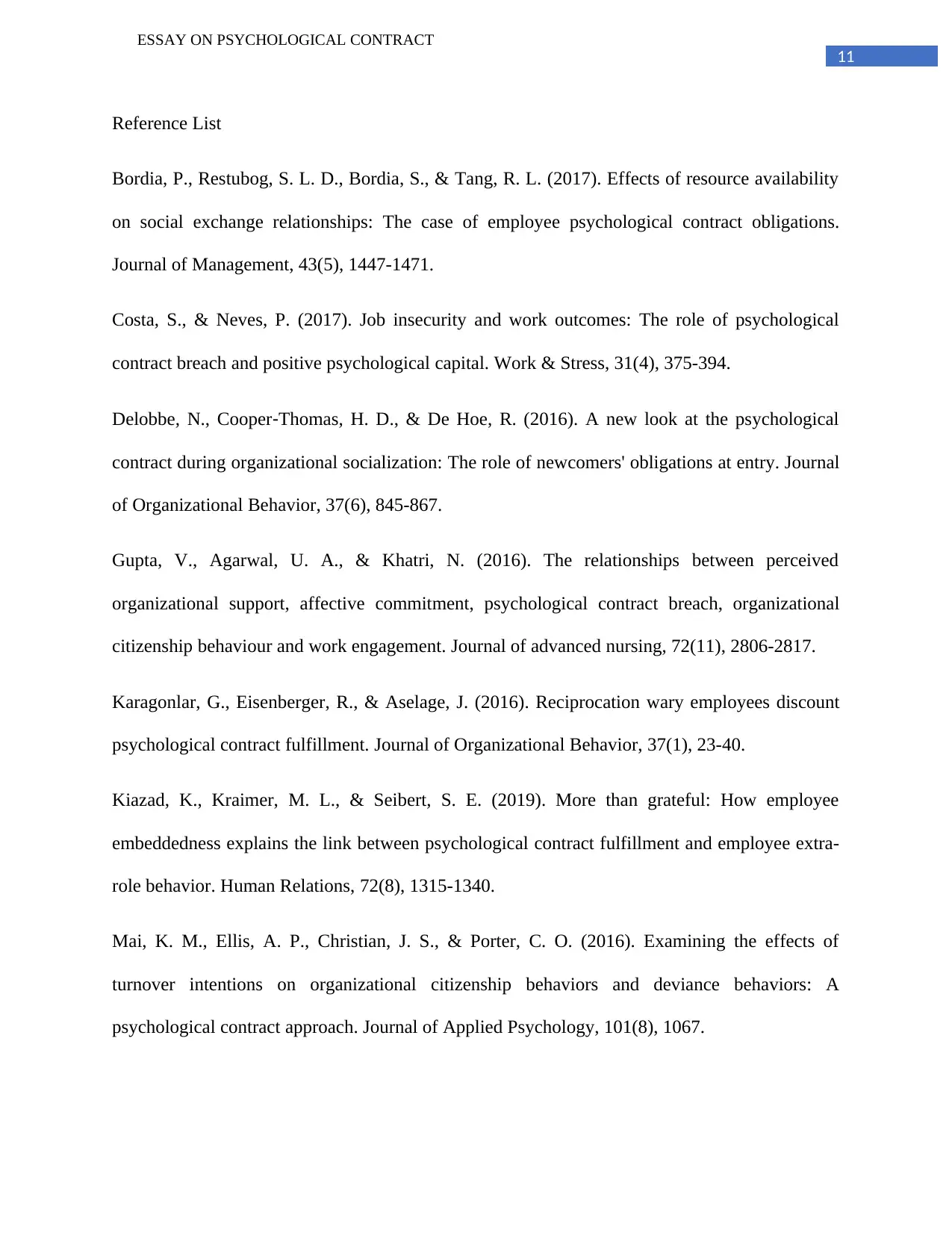
11
ESSAY ON PSYCHOLOGICAL CONTRACT
Reference List
Bordia, P., Restubog, S. L. D., Bordia, S., & Tang, R. L. (2017). Effects of resource availability
on social exchange relationships: The case of employee psychological contract obligations.
Journal of Management, 43(5), 1447-1471.
Costa, S., & Neves, P. (2017). Job insecurity and work outcomes: The role of psychological
contract breach and positive psychological capital. Work & Stress, 31(4), 375-394.
Delobbe, N., Cooper‐Thomas, H. D., & De Hoe, R. (2016). A new look at the psychological
contract during organizational socialization: The role of newcomers' obligations at entry. Journal
of Organizational Behavior, 37(6), 845-867.
Gupta, V., Agarwal, U. A., & Khatri, N. (2016). The relationships between perceived
organizational support, affective commitment, psychological contract breach, organizational
citizenship behaviour and work engagement. Journal of advanced nursing, 72(11), 2806-2817.
Karagonlar, G., Eisenberger, R., & Aselage, J. (2016). Reciprocation wary employees discount
psychological contract fulfillment. Journal of Organizational Behavior, 37(1), 23-40.
Kiazad, K., Kraimer, M. L., & Seibert, S. E. (2019). More than grateful: How employee
embeddedness explains the link between psychological contract fulfillment and employee extra-
role behavior. Human Relations, 72(8), 1315-1340.
Mai, K. M., Ellis, A. P., Christian, J. S., & Porter, C. O. (2016). Examining the effects of
turnover intentions on organizational citizenship behaviors and deviance behaviors: A
psychological contract approach. Journal of Applied Psychology, 101(8), 1067.
ESSAY ON PSYCHOLOGICAL CONTRACT
Reference List
Bordia, P., Restubog, S. L. D., Bordia, S., & Tang, R. L. (2017). Effects of resource availability
on social exchange relationships: The case of employee psychological contract obligations.
Journal of Management, 43(5), 1447-1471.
Costa, S., & Neves, P. (2017). Job insecurity and work outcomes: The role of psychological
contract breach and positive psychological capital. Work & Stress, 31(4), 375-394.
Delobbe, N., Cooper‐Thomas, H. D., & De Hoe, R. (2016). A new look at the psychological
contract during organizational socialization: The role of newcomers' obligations at entry. Journal
of Organizational Behavior, 37(6), 845-867.
Gupta, V., Agarwal, U. A., & Khatri, N. (2016). The relationships between perceived
organizational support, affective commitment, psychological contract breach, organizational
citizenship behaviour and work engagement. Journal of advanced nursing, 72(11), 2806-2817.
Karagonlar, G., Eisenberger, R., & Aselage, J. (2016). Reciprocation wary employees discount
psychological contract fulfillment. Journal of Organizational Behavior, 37(1), 23-40.
Kiazad, K., Kraimer, M. L., & Seibert, S. E. (2019). More than grateful: How employee
embeddedness explains the link between psychological contract fulfillment and employee extra-
role behavior. Human Relations, 72(8), 1315-1340.
Mai, K. M., Ellis, A. P., Christian, J. S., & Porter, C. O. (2016). Examining the effects of
turnover intentions on organizational citizenship behaviors and deviance behaviors: A
psychological contract approach. Journal of Applied Psychology, 101(8), 1067.
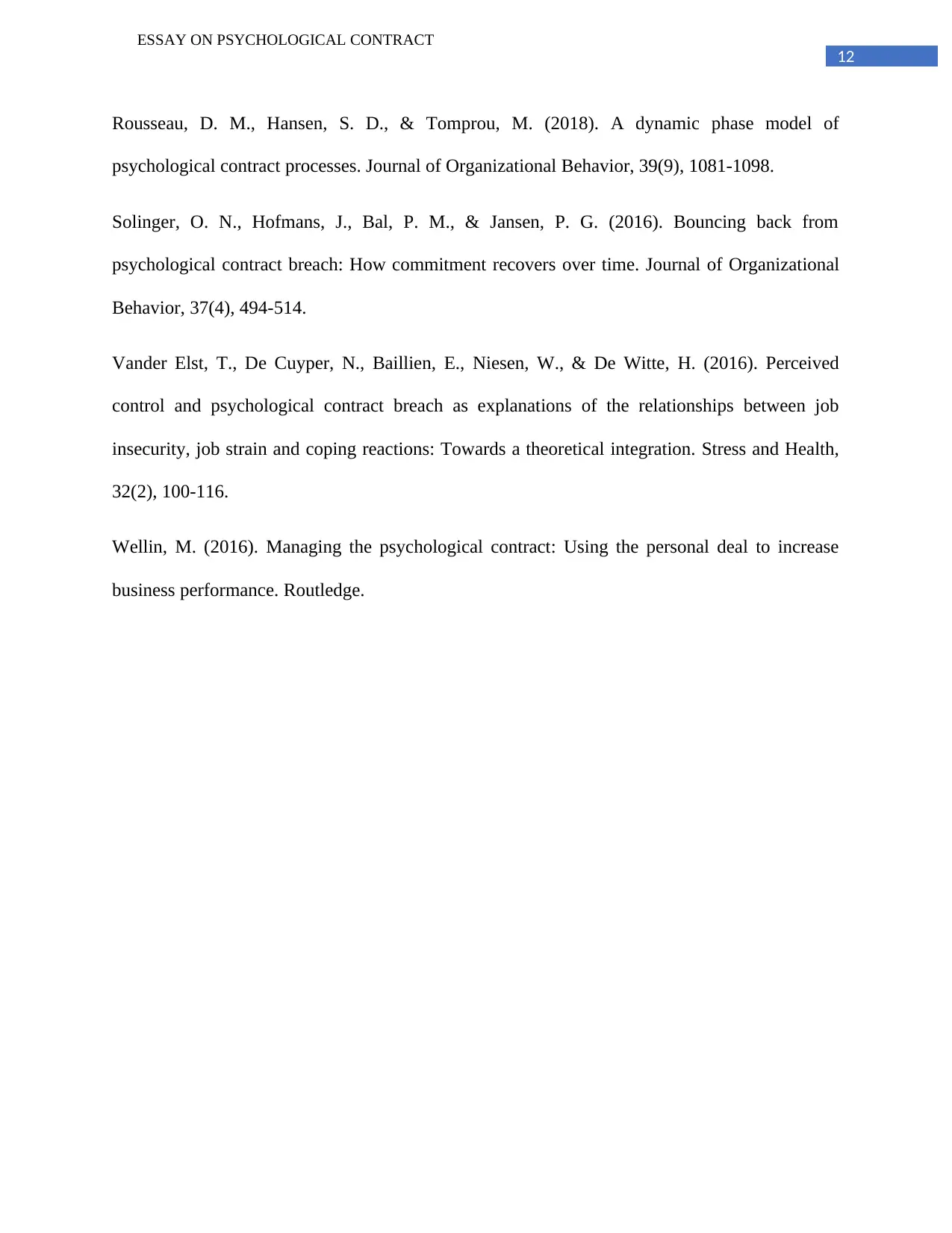
12
ESSAY ON PSYCHOLOGICAL CONTRACT
Rousseau, D. M., Hansen, S. D., & Tomprou, M. (2018). A dynamic phase model of
psychological contract processes. Journal of Organizational Behavior, 39(9), 1081-1098.
Solinger, O. N., Hofmans, J., Bal, P. M., & Jansen, P. G. (2016). Bouncing back from
psychological contract breach: How commitment recovers over time. Journal of Organizational
Behavior, 37(4), 494-514.
Vander Elst, T., De Cuyper, N., Baillien, E., Niesen, W., & De Witte, H. (2016). Perceived
control and psychological contract breach as explanations of the relationships between job
insecurity, job strain and coping reactions: Towards a theoretical integration. Stress and Health,
32(2), 100-116.
Wellin, M. (2016). Managing the psychological contract: Using the personal deal to increase
business performance. Routledge.
ESSAY ON PSYCHOLOGICAL CONTRACT
Rousseau, D. M., Hansen, S. D., & Tomprou, M. (2018). A dynamic phase model of
psychological contract processes. Journal of Organizational Behavior, 39(9), 1081-1098.
Solinger, O. N., Hofmans, J., Bal, P. M., & Jansen, P. G. (2016). Bouncing back from
psychological contract breach: How commitment recovers over time. Journal of Organizational
Behavior, 37(4), 494-514.
Vander Elst, T., De Cuyper, N., Baillien, E., Niesen, W., & De Witte, H. (2016). Perceived
control and psychological contract breach as explanations of the relationships between job
insecurity, job strain and coping reactions: Towards a theoretical integration. Stress and Health,
32(2), 100-116.
Wellin, M. (2016). Managing the psychological contract: Using the personal deal to increase
business performance. Routledge.
⊘ This is a preview!⊘
Do you want full access?
Subscribe today to unlock all pages.

Trusted by 1+ million students worldwide
1 out of 12
Related Documents
Your All-in-One AI-Powered Toolkit for Academic Success.
+13062052269
info@desklib.com
Available 24*7 on WhatsApp / Email
![[object Object]](/_next/static/media/star-bottom.7253800d.svg)
Unlock your academic potential
Copyright © 2020–2026 A2Z Services. All Rights Reserved. Developed and managed by ZUCOL.





